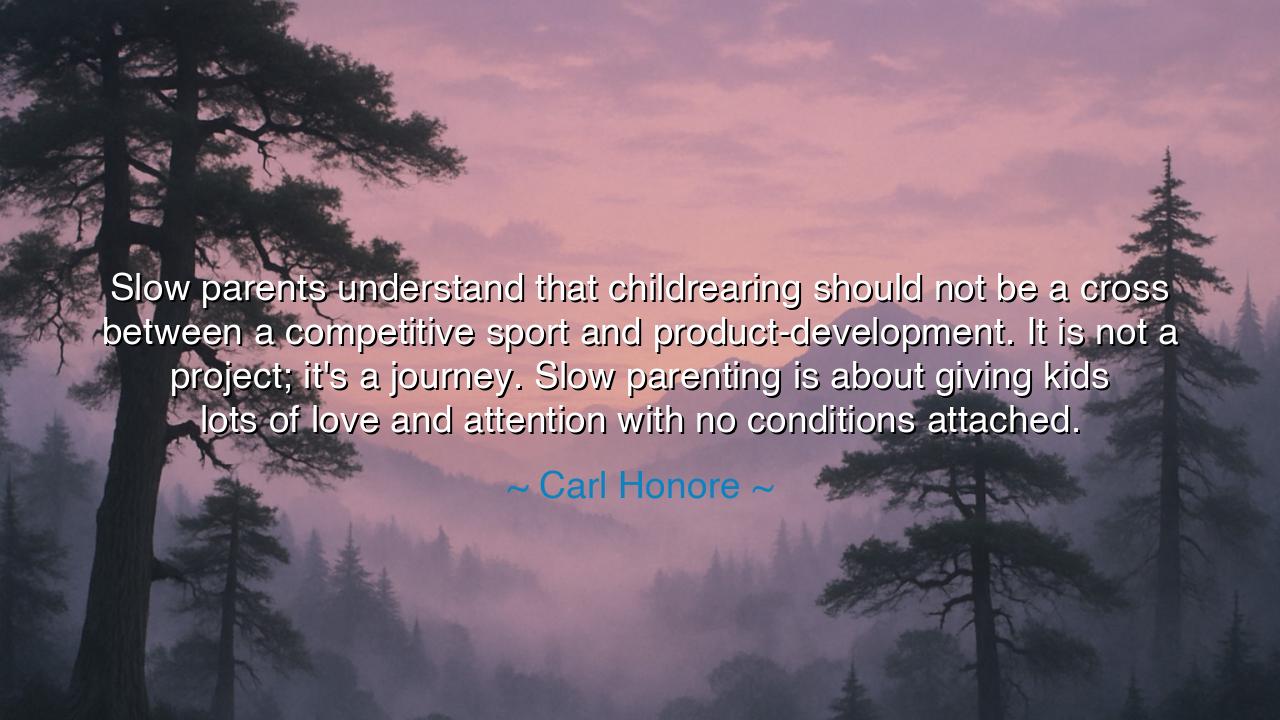
Slow parents understand that childrearing should not be a cross
Slow parents understand that childrearing should not be a cross between a competitive sport and product-development. It is not a project; it's a journey. Slow parenting is about giving kids lots of love and attention with no conditions attached.






Hearken, O seekers of wisdom, to the sage counsel of Carl Honore, who illuminates the path of slow parenting, a practice both profound and countercultural in its simplicity. He warns against the folly of treating childrearing as a contest of achievement or a project of efficiency, where the young are measured by milestones, accomplishments, or comparison. True guardianship, he teaches, is not a race nor an assembly line of skills, but a sacred journey, wherein the child’s growth unfolds in its own time, nurtured by the steady presence and unconditional love of the parent.
The origin of this insight lies in the wisdom of generations who understood that children are not commodities to be optimized nor tasks to be completed. Across the annals of time, from the contemplative teachings of Confucius to the reflective practices of monastic communities, it has been observed that the cultivation of the human heart requires patience, attention, and reverence. Honore’s modern articulation echoes this ancient truth: the parent’s role is to accompany, to witness, and to nurture, rather than to impose schedules and measure progress against arbitrary standards.
Consider the life of Jean-Jacques Rousseau, whose treatise Emile exalted the natural development of the child above rigid instruction or societal pressure. He championed the principle that children must be allowed to grow according to their innate rhythms, guided by gentle attention and moral example rather than coercion or competitive comparison. Rousseau’s advocacy for patience, observation, and encouragement mirrors Honore’s call for slow parenting: the child’s spirit flourishes most fully when freed from the tyranny of external benchmarks.
The emotional resonance of slow parenting is deep and enduring. When a parent grants time, attention, and unconditional love, the child senses security, belonging, and worth. The frantic pursuit of achievement, by contrast, can create tension, anxiety, and the sense that love is contingent upon success. Honore reminds us that presence over productivity is the cornerstone of healthy development. The parent who slows their pace, who listens fully, and who meets the child without expectation, provides a sanctuary for the soul to grow resilient, compassionate, and self-aware.
In practical terms, the slow parenting approach demands conscious choice. It asks guardians to resist the pressures of comparison, over-scheduling, and the relentless push for early achievement. Instead, one cultivates rituals of connection, unhurried conversation, and shared experience. Historical examples abound: the great artists, thinkers, and leaders often recount childhoods marked not by rigorous instruction or competition but by time spent in exploration, conversation, and nurturance. Such an environment fosters creativity, confidence, and empathy—qualities that cannot be hurried into being.
This philosophy also carries a heroic dimension: the courage to resist societal pressures, to honor the child’s pace, and to accept that growth and learning need not be forced. It is an act of rebellion against a world obsessed with measurable output, a declaration that the intrinsic value of a human being transcends grades, trophies, or timelines. In so doing, the parent becomes both protector and guide, shepherding the child through the unfolding journey of life with steady hands and an open heart.
From this teaching emerges a practical lesson: approach childrearing as a journey, not a project; as love, not a task to be completed. Offer attention freely, encourage curiosity, and meet each stage of development with patience and respect. Embrace unhurried moments, celebrate effort rather than outcome, and cultivate a home where the child’s presence is treasured for itself, not for what it produces. In this way, the parent fosters not only competence but character, ensuring that the child’s growth is as profound as it is enduring.
Thus, Carl Honore imparts a timeless truth: slow parenting honors the sacred rhythm of childhood, nurturing the spirit with attention, patience, and unconditional love. Let all who bear this charge embrace the journey, resist the siren call of comparison and haste, and cultivate a home where the young can flourish fully and freely. For in the deliberate stillness of presence lies the profound power to shape hearts, minds, and futures—not through pressure, but through the enduring gift of mindful love.






AAdministratorAdministrator
Welcome, honored guests. Please leave a comment, we will respond soon